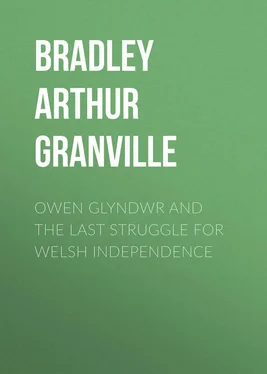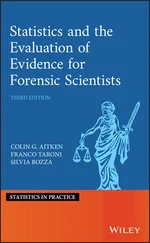Arthur Bradley - Owen Glyndwr and the Last Struggle for Welsh Independence
Здесь есть возможность читать онлайн «Arthur Bradley - Owen Glyndwr and the Last Struggle for Welsh Independence» — ознакомительный отрывок электронной книги совершенно бесплатно, а после прочтения отрывка купить полную версию. В некоторых случаях можно слушать аудио, скачать через торрент в формате fb2 и присутствует краткое содержание. Жанр: foreign_antique, foreign_prose, foreign_language, на английском языке. Описание произведения, (предисловие) а так же отзывы посетителей доступны на портале библиотеки ЛибКат.
- Название:Owen Glyndwr and the Last Struggle for Welsh Independence
- Автор:
- Жанр:
- Год:неизвестен
- ISBN:нет данных
- Рейтинг книги:5 / 5. Голосов: 1
-
Избранное:Добавить в избранное
- Отзывы:
-
Ваша оценка:
- 100
- 1
- 2
- 3
- 4
- 5
Owen Glyndwr and the Last Struggle for Welsh Independence: краткое содержание, описание и аннотация
Предлагаем к чтению аннотацию, описание, краткое содержание или предисловие (зависит от того, что написал сам автор книги «Owen Glyndwr and the Last Struggle for Welsh Independence»). Если вы не нашли необходимую информацию о книге — напишите в комментариях, мы постараемся отыскать её.
Owen Glyndwr and the Last Struggle for Welsh Independence — читать онлайн ознакомительный отрывок
Ниже представлен текст книги, разбитый по страницам. Система сохранения места последней прочитанной страницы, позволяет с удобством читать онлайн бесплатно книгу «Owen Glyndwr and the Last Struggle for Welsh Independence», без необходимости каждый раз заново искать на чём Вы остановились. Поставьте закладку, и сможете в любой момент перейти на страницу, на которой закончили чтение.
Интервал:
Закладка:
Dafydd, the third brother, had supported Owen, and he, too, was seized and securely confined. Llewelyn, now supreme in North Wales, becomes the outstanding figure around which the closing scene of the long and heroic resistance of the Welsh henceforth gathers. South Wales was in a distracted state. The Lord Marchers and the King’s Bailiffs, backed by English support, had taken fresh heart from Welsh dissensions and were pressing hardly on those native chieftains who did not side with them. Every chieftain and noble in Wales whose patriotism had not been tampered with now took up arms. Llewelyn was universally recognised as the national leader, and the years 1257-58 were one long turmoil of war and battle in every part of Wales. Llewelyn had cleared off all recent aggression, fallen with heavy hand on the old settled barons, and smitten the traitors among his fellow-countrymen hip and thigh. A battle was fought on the Towy, which some chroniclers say was the bloodiest ever engaged in between Welsh and English, to the worsting of the latter and the loss of two thousand men.
The Perfeddwlad had been granted to Prince Edward, then Earl of Chester. His agents there had distinguished themselves, even in those cruel times, for intolerable oppression. Llewelyn in his vengeance swept Edward’s new property bare from the Conway to the Dee. The future conqueror and organiser of Wales was at this moment hardly pressed. His Welsh friends, like the then Prince of Powys, were heavily punished by Llewelyn and their lands laid waste. Edward sent to Ireland for succour, but the Irish ships were met at sea by those of Llewelyn and driven back. Henry now returned to his son’s assistance, and, drawing together “the whole strength of England from St. Michael’s Mount to the river Tweed,” executed the familiar promenade across the wasted Perfeddwlad, and experienced the familiar sense of impotence upon the Conway with its well defended forts and frowning mountains alive with agile spearmen.
Once again the tide of battle rolled back to the English border, and the first serious punishment we hear of the Welsh receiving curiously enough was at the hands of some German cavalry imported and led by Lord Audley, whose large horses seem to have struck some terror into the mountaineers. But this is a detail. Llewelyn may almost be said to have repeated the exploits of his grandfather and reconquered Wales. Even Flemish Pembroke had been forced to its knees. His followers to the number of ten thousand had bound themselves by oath to die rather than submit, and these, being picked men and inured to war, were a formidable nucleus for the fighting strength of Wales to rally round. The revolt, too, of Simon de Montfort against Henry was all in favour of Llewelyn, who took the former’s part and was able to render him considerable personal service in the decline of his success.
Through many years of intermittent strife and varying fortunes the balance of power remained with Llewelyn, till in 1267 a peace was made at Shrewsbury very greatly in his favour. By this agreement Henry in consideration of a sum of money undertook to recognise Llewelyn as Prince of all Wales and entitled to receive homage and fealty from every prince and noble in the country save the sadly shorn representatives of the old line of Deheubarth. But after two years’ enjoyment of this contract the King’s death and the succession of the strenuous Prince Edward threw everything once more into confusion.
It is true that Edward, who was in the Holy Land fighting Turks, took two years in finding his way home. But when he did so, in 1274, and was crowned King he threw his father’s treaty with Llewelyn to the winds; an action for which, it is true, the latter gave him some excuse by refusing to attend at his coronation, not from recusancy, but from a well-grounded fear that his life would not be safe from certain Anglo-Norman nobles whose territory he would have to pass through.
Now comes a passage in Llewelyn’s stormy life that his admirers would fain forget, since it records how for love of a woman he reversed the indomitable front he had hitherto shown to the invading English, and submitted almost without a blow to the dictation of the returned Crusader, whom he had so often beaten of old in the Welsh Marches. It was perhaps the memory of these former rebuffs that made the proud and warlike Edward so vindictive towards Llewelyn. A weapon, too, was at this moment placed in his hands which was to assist him in a manner he had not dreamed of. The young daughter of the late Simon de Montfort, to whom the Welsh Prince was betrothed and whom he is said to have deeply loved, was sailing from France to become his bride. In anxiety to escape the English, the ship that bore her unluckily ran among some Bristol vessels off the Scilly Islands. The captains seized the prospective bride and carried her at once to Edward, who was on the point of invading Wales with two armies. Four years of peace had doubtless weakened the strong Welsh league that had worked such wonders against Henry III. Numbers of his old friends at any rate failed to respond to Llewelyn’s call. The Prince had now before him the alternatives of immediate union with his betrothed, or of war and chaos with a lukewarm or hostile South Wales and certainly a hostile Powys added to the power of England.
After being cooped up for some weeks in the Snowdon mountains by the royal army, Llewelyn signed at length a treaty with Edward, the conditions of which were as humiliating as if he had been crushed to the earth by a series of disastrous battles, whereas he was in truth the still recognised suzerain of all Wales. To put the case, or the gist of it, briefly: all Wales except the Snowdon lordships (the present Carnarvonshire) was to revert absolutely to the King of England, Welsh and alien lords alike becoming his tenants. Even Anglesey was to revert to the Crown in the event of Llewelyn’s dying without issue. Nothing was to be left of Welsh independence but the “cantrefs,” or lordships, constituting Snowdonia; and over this remnant Llewelyn’s heirs were to be graciously permitted to reign in peace. The Prince’s passion had proved greater than his patriotism; the treaty was signed at Conway, and King Edward, who had advanced unopposed to Cardiganshire, withdrew his troops.
“The force of love,” says the chronicler, groaning over this depressing episode, “does indeed work wonders.” Llewelyn, not long afterwards, was married in great pomp at Worcester in presence of the whole Court of England, the King himself giving the bride away, and the late ruler of all Wales and now lord merely of Snowdonia, with a life interest in Anglesey, retired to the obscurity of his contracted honours. Here, amid the Carnarvon mountains, he began ere long to feel the prickings of conscience, and remorse for the weak part he had played.
Edward, too, kept open the wound by frequently summoning him to this place or that on various pleas, and the Welsh Prince, dreading treachery and remembering his father, Griffith’s, fate, as constantly refused to go without a guaranty of safety. The greater part of the present counties of Carmarthen and Cardigan were already King’s ground. As forming part of the old Principality of South Wales, and therefore not Marcher property, they had come to Edward. A county court had before this been established at Carmarthen, and efforts to make this territory shire ground had been feebly made, but they were now vigorously renewed, and the Perfeddwlad was treated in savage fashion. Ferocity was the distinguishing mark of all the servants of Edward I.
Читать дальшеИнтервал:
Закладка:
Похожие книги на «Owen Glyndwr and the Last Struggle for Welsh Independence»
Представляем Вашему вниманию похожие книги на «Owen Glyndwr and the Last Struggle for Welsh Independence» списком для выбора. Мы отобрали схожую по названию и смыслу литературу в надежде предоставить читателям больше вариантов отыскать новые, интересные, ещё непрочитанные произведения.
Обсуждение, отзывы о книге «Owen Glyndwr and the Last Struggle for Welsh Independence» и просто собственные мнения читателей. Оставьте ваши комментарии, напишите, что Вы думаете о произведении, его смысле или главных героях. Укажите что конкретно понравилось, а что нет, и почему Вы так считаете.












